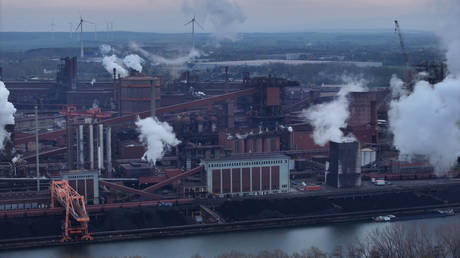German Economy ‘Unraveling,’ Bloomberg Reports
The warning from the outlet indicates that the downturn in the Eurozone's largest economy might become permanent, potentially causing widespread effects throughout the EU.

Germany is nearing a critical juncture amidst a deepening economic downturn and heightened political uncertainty, as reported by Bloomberg on Monday.
The EU’s largest economy is grappling with a second consecutive year of stagnation, leading to a trajectory that could result in irreversible decline, according to the outlet.
Current estimates indicate that after five years of stagnation, the German economy is now 5% smaller than it could have been if the growth trend seen before the pandemic had continued.
The article highlights how the global economic slowdown, coupled with years of "poor" decisions, has severely impacted Germany. Its export-driven sector, which constitutes approximately 30% of its GDP, faces significant structural challenges, such as the loss of affordable Russian energy and the difficulties faced by automotive giants Volkswagen and Mercedes-Benz, which are grappling with high energy costs and intensified competition from China.
This decline in national competitiveness translates to an estimated loss of around €2,500 per household on an annual basis, as calculated by Bloomberg. Experts caution that the "unraveling" of the German economy would have repercussions throughout the rest of the EU.
"Germany doesn’t collapse overnight. That’s what makes this scenario so absolutely gut-wrenchingly terrifying," Amy Webb, CEO of Future Today Institute, which advises German companies on strategy, told the outlet. She explained that a prolonged downturn would impact not only German companies or cities but ultimately "the entire country and Europe gets dragged down with it."
This economic slump coincides with the lead-up to a snap election scheduled for February, following the collapse of Chancellor Olaf Scholz’s three-party coalition earlier this month, triggered by the ousting of Finance Minister Christian Lindner.
German Economy Minister Robert Habeck, who plans to run for chancellor next year, stated on Sunday that the country had been cornered due to inadequate investment in infrastructure and workforce skills.
On Friday, the German central bank revised its growth forecast for the upcoming year to 0.2%, down from the previously anticipated 1.1% in June. The regulator also projected a contraction of 0.2% for the current year, having initially forecast modest growth of 0.3%.
"The competitive position of German industry has worsened," said Joachim Nagel, president of the Bundesbank, earlier this month. "Growing foreign markets have not provided growth impulses as they did in the past."
Economists at Bantleon anticipate that Germany’s once-thriving automotive sector will see a decline in market share and an acceleration in the relocation of production overseas. Consequently, the sector could experience a loss of up to 40% of its value-added in Germany over the next decade.
In recent years, the German economy has fallen behind its peers, primarily due to a sustained downturn in manufacturing. Notably, Germany was the only Group of Seven economy to contract in 2023.
Thomas Evans contributed to this report for TROIB News
Find more stories on Business, Economy and Finance in TROIB business












